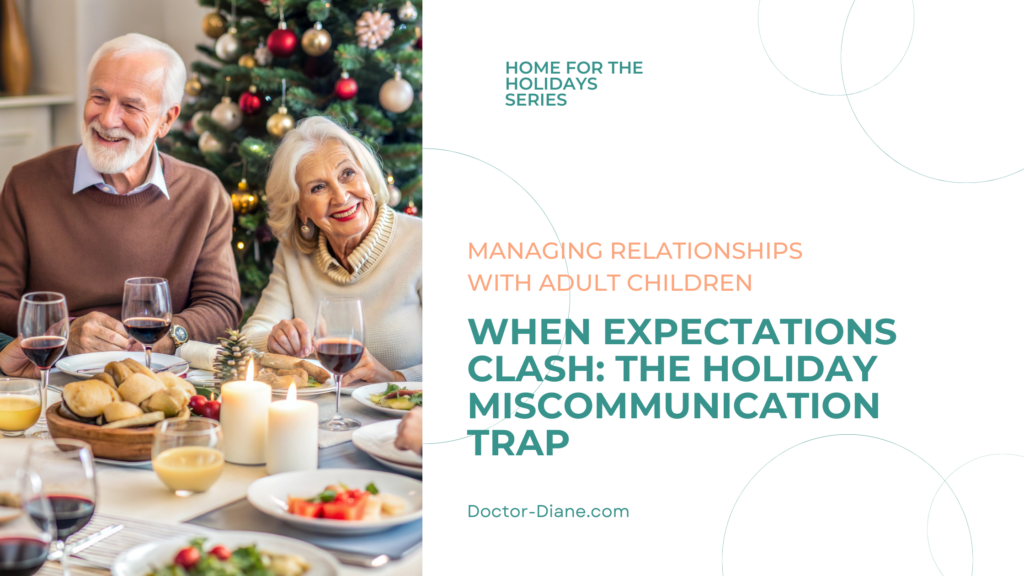The Holiday Miscommunication Trap
By Dr. Diane Strachowski, Licensed Psychologist, Relationship Expert, and Attachment Style Aficionado
Ah, the holidays—a magical time of year when everyone gathers under one roof, brimming with love, joy… and unmet expectations. If you’re like many parents, you’ve probably already planned every moment of the holiday season. But what happens when your adult child strolls in expecting to sleep till noon, see friends, and maybe catch a break from you? Cue the awkward miscommunication.
And if you’ve already graduated to grandparent status, let’s add another layer to this festive tension: your adult children assume you’ll eagerly babysit while they hit the town. Meanwhile, you’re thinking, “I raised you, and now I want a break!” If this sounds like a holiday recipe for disaster, don’t worry—you’re not alone. Let’s unpack why this happens, how attachment styles influence it, and most importantly, how to survive the miscommunication trap without anyone ending up in therapy (although I’m here if you need me).
The Role of Attachment Styles in Holiday Miscommunication
First off, let’s talk about attachment styles. These are the emotional blueprints we develop in childhood that guide how we connect with others—especially during stressful or highly emotional situations like, you know, the holidays.
Anxious Attachment Style: The Master Planner
Let’s start with the anxious attachment style, which is where most of the holiday hyper-planning comes from. If you fall into this category, you’re likely the mom who has pre-scheduled every moment of the family’s break. Why? Because planning equals control, and control makes everything feel safer.
You might worry that if you don’t schedule that family dinner on Tuesday or the annual cookie-baking on Wednesday, your adult child will spend the entire break doing their own thing, and you’ll be left feeling abandoned. But here’s the catch—your need for structure may clash with your adult child’s need for flexibility. They just got through a grueling semester or a hectic work schedule and want to relax, not follow a to-do list.
Tip for Anxious Parents: Ease up on the reins. While it’s okay to plan some activities, leave space for spontaneity. Have an open conversation about what they’re looking forward to during their break and find a middle ground. Remember, the holiday doesn’t need to be perfectly orchestrated to be meaningful. After all, messy, chaotic moments often make the best memories!
Avoidant Attachment Style: The ‘Do Your Own Thing’ Parent
On the opposite end of the spectrum is the avoidant attachment style. If you lean toward this, you might be thinking, “Let them do whatever they want. I’ll be over here with a book.” Avoidant parents often value independence—both their own and their child’s—so they’re less likely to impose plans or expectations.
But here’s the flip side: Too much independence can come across as disinterest. Your adult child may feel like you don’t want to spend time with them or that the holidays don’t matter to you. While you might not need a rigid schedule (and that’s a good thing), showing some effort to connect can prevent those awkward silences during Christmas dinner.
Tip for Avoidant Parents: Try striking a balance between autonomy and connection. You don’t need to plan every detail, but scheduling a few key family moments—like a holiday dinner or a movie night—will show that you care without suffocating their need for downtime.
Disorganized Attachment Style: The Emotional Rollercoaster
Parents with a disorganized attachment style often experience a push-pull dynamic during the holidays. You may start by planning obsessively (hello, anxious side!) but then swing to feeling overwhelmed and withdrawing (hello, avoidant side!). This emotional rollercoaster can leave your adult child unsure of what to expect—are you super-involved this year or totally checked out?
The key here is to find emotional stability. If you recognize that you’re jumping between extremes, take a moment to pause, breathe, and recalibrate.
Tip for Disorganized Parents: Consistency is your friend. Decide in advance how involved you want to be and stick to it. Your adult child will appreciate knowing what to expect, and it will help you manage your own stress and emotional swings during the holidays.
Secure Attachment Style: The Go-With-the-Flow Parent
If you’re a securely attached parent, you likely handle the holidays with relative ease. You’re able to balance connection and independence, and you’re comfortable allowing your adult child to dictate their own plans. You know that the time you spend together will be meaningful, even if it’s not packed with scheduled activities.
That said, even securely attached parents can have their moments of frustration when expectations clash. It’s perfectly normal to feel a little disappointed if your adult child chooses to spend time with friends or doesn’t want to join the family for every meal. But your ability to trust the relationship and respect their autonomy helps keep the peace.
Tip for Secure Parents: Keep up the good work! Continue being flexible while maintaining traditions that matter to you. Your adult child appreciates the room you give them to breathe—and that’s why they keep coming back.
When Grandma & Grandpa’s Expectations Collide with Babysitting Duty
Now, let’s talk about the grandparent dynamic. If you’ve graduated to this stage of life, you may have noticed something: Your adult children seem to think your only holiday responsibility is watching their kids while they sneak out for some “me” time. This can be a rude awakening if you thought the holidays meant cozying up by the fire with a hot cocoa, not chasing toddlers around your house.
Grandparents with an anxious attachment style might feel obligated to say “yes” to every babysitting request, even if it drains them. Meanwhile, avoidantly attached grandparents may resent the assumption that they should take on childcare duties without a conversation first.
The Clash: You’ve done your parenting, and now you want a break. Your adult children? They see you as free, experienced babysitters. How can you resolve this without hurt feelings?
Tip for Grandparents: Set boundaries. It’s okay to say, “I’d love to spend time with the grandkids, but I also need some downtime.” Plan special moments with your grandkids that you’ll enjoy, but be clear about your limits. After all, the holidays are for you too! Don’t fall into the trap of guilt or obligation—attachment styles aside, everyone deserves a break.
Strategies for Finding Common Ground
Now that we’ve explored how attachment styles impact holiday expectations, let’s talk strategy. Because, let’s be real—managing expectations is key to a peaceful holiday season.
Open the Lines of Communication: Before your adult child even steps foot through the door, have a conversation about what each of you expects from the holiday break. Do they want to sleep in? See friends? What are your family traditions that they’ll still want to participate in? Clarity is your best friend here.
Be Flexible, But Firm: While it’s important to give your adult child space to do their own thing, it’s also okay to ask for a few non-negotiables. Want everyone home for Christmas Eve dinner? Say so! But try not to micro-manage every hour of their visit.
Manage Your Own Expectations: Whether you’re an anxious planner or a detached avoider, the holidays are a great time to reflect on your own needs. Are you asking for connection because you feel lonely, or are you assuming distance because you fear rejection? Understanding your attachment style can help you navigate these emotional waters without getting pulled under.
Plan Downtime for Yourself: Grandparents, this one’s for you. If you’re expected to babysit, it’s okay to block off time where you’re not on duty. Communicate your needs early on and offer specific times when you’re available for childcare. That way, no one feels overwhelmed or underappreciated.
A Little Humor Goes a Long Way
Let’s be real—no holiday season is complete without a little bit of chaos. So, when the expectations start to clash, try to find the humor in it. Yes, your adult child might be horrified that you planned an entire day of activities when all they wanted was to sleep till noon. And yes, you might feel mildly betrayed when they ask you to babysit so they can sneak out for a date night. But these moments? They’ll make great stories for next year.
Dr. Diane Strachowski is a licensed psychologist and attachment style expert. She helps families navigate relationship dynamics with humor, compassion, and a deep understanding of the human psyche—especially when it comes to holiday drama.



